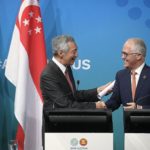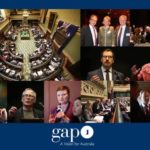The Importance of Cultural Exposure
Getting access to different cultures is important in appreciating the positive aspects our multicultural society has to offer. Laurence Strano shares his experiences in a life-long exposure to a multitude of cultures.
Being born in Australia from Italian and Romanian parents was an interesting experience in itself. The extended families meant that during the week I experienced listening and not understanding Romanian as my mother spoke with her parents who lived next door to us. Then on the weekend I went over to my father’s Italian family where the same thing happened. Nana refused to speak a word of English despite the fact that she had been in Australia for 24 years. She said the doctor, the baker and the greengrocer were all Italians so she did not need English. All conversations there were totally in Italian.
Because of the fact that the home-front conversation during the week with my sister and myself and my parents was totally in English, one tended to turn off to the sounds of Romanian and Italian. I did enjoy my sojourns to the then Italian Apia and Marconi clubs, and because my father was a wine and spirit merchant selling macaroni, he travelled to places like Griffith and Leeton and around Canberra, where there were enclaves of Italians. My father was one of the founders of the Club Marconi.
I well remember sitting in his car in Leeton when an Italian approached and spoke Italian. I retorted ‘Mi scusi, non capisco’ (‘I’m sorry, I don’t understand’). Thank God I picked up a few words. He said in English ‘What sort of Italian are you? If you look like a wog you should speak like one.’
My mother was active in the Romanian Association, but I refused to dance Romanian folk dances, although my sister participated. Nevertheless I did become President of the Romanian Association for a short time. In my youth I enjoyed the company of my Greek friends who went to my school, East Hills Boys High School. This school was near the then Holsworthy migrant hostel.
I also enjoyed the company of a Russian girlfriend. I loved visiting her family as there frequently was dancing in the streets and wonderful Russian music, which is extremely moving and sensitive. My first wife was of Polish ancestry, and her parents were moved from Poland to Germany as forced labourers. How happy they were to be in Australia after their European wartime experiences.
Having been blessed to work with academia and then the Australian Government I was able to study many countries from a country risk perspective as my organisation insured exports and investments to all parts of the globe. I became familiar with the cultural richness of so many countries and aspects which in many cases held back their development. I took a job with the Commonwealth Secretariat and was seconded to Nigeria. I then spent a number of months experiencing West Africa – Ghana, Benin and the Ivory Coast.
Coming back to Australia I spent a lot of time with Arabic friends – Egyptians, Lebanese, Jordanian and Syrian. I met so many Lebanese people and eventually wrote about the Arabic people in Australia. The leader of an Arabic organisation asked me to assist with trading difficulties with Vietnam (the Australian government would not assist with his exports through Export Finance and Insurance Corporation, as they did not have experience with the market). This then took me on two decades of assisting development of business with Vietnam.
I was invited with my second wife, who was from Serbia, to a traditional Indian wedding in the North of India Chandīgarh and Jalindah. This followed many friendships with Indian people, some of whom I assisted to invest in Australia. I became a President of the Association for spiritual Healing and Awakening (ASHA or Hope) with an Indian Guru.
I helped a number of South African Jewish people invest in Australia. I had the pleasure of visiting and experiencing Iranian culture in Tehran as I attended a conference there with Graham Lightfoot and George Assaf and the Primary Industry Minister John Kerin in the company of the former Ambassador to Iran, John Lander.
I had the opportunity to travel to China with an Iranian man in Australia and visit his home in Tehran and his business associates in Pakistan. We tried to establish an Australian College in Pakistan, but the political situation was too volatile.
I was fortunate to see the importance of multicultural marketing and conduct research with Koreans, Japanese, Vietnamese and Italian groups in Australia. We tried to set up a college in Thailand. I enjoyed travelling to Singapore and Malaysia. A trek from northern Lebanon to Damascus was a wonderful, holy experience.
I consider myself cosmopolitan, but really appreciate Australia’s national interest. I mentored many students, including children of diplomats in Australia. I love my aboriginal friends.
So what have I learnt?
- Because of Australia’s cultural diversity one can test market here in Australia before embarking onto the international arena
- the importance of cultural sensitivity and humility
- firstly acknowledge the country where you live, its culture and be to others as you would have them be to you
- help wherever help can be provided
- what you give is what you get
- in the giving the return is exponentially greater, no matter which culture one is interacting with
- aim to understand the cross-cultural nuances and get to know each culture before visiting the country concerned
Get access to as many cultures as possible, and you will realise that we are one people living in harmony.
Laurence Strano advises Small to Medium sized Enterprises (SMEs) in Australia and throughout Asia, Europe and the Middle East on globalisation. He is Principal Consultant of Laurence Strano & Consulting Associates, Director of Fidelity Energy Ltd, FVG Capital Pty Ltd and Fidelity Ventures Pty Ltd. Laurence is President of The Association of Spiritual Healing and Awakening and the Australia Vietnam Business Council. He is Ambassador of the FSHD Global Research Foundation. Formerly, Laurence was Chief Economist of EFIC for 14 years. He was Advisor to the Commonwealth Secretariat and subsequently to the Ministry of Trade and Economic Development in Nigeria. Laurence was International Affairs Officer of Conzinc Riotinto Australia Limited (now Riotinto), Stock Broking Representative, Foundation Executive and Director of the Sydney Trade Point (under UN auspices), New South Wales Trade Efficiency Association. He was President of the New South Wales–Vietnam Chamber of Commerce for 10 years and Visiting Lecturer for the University of Technology, Sydney and Macquarie University.













